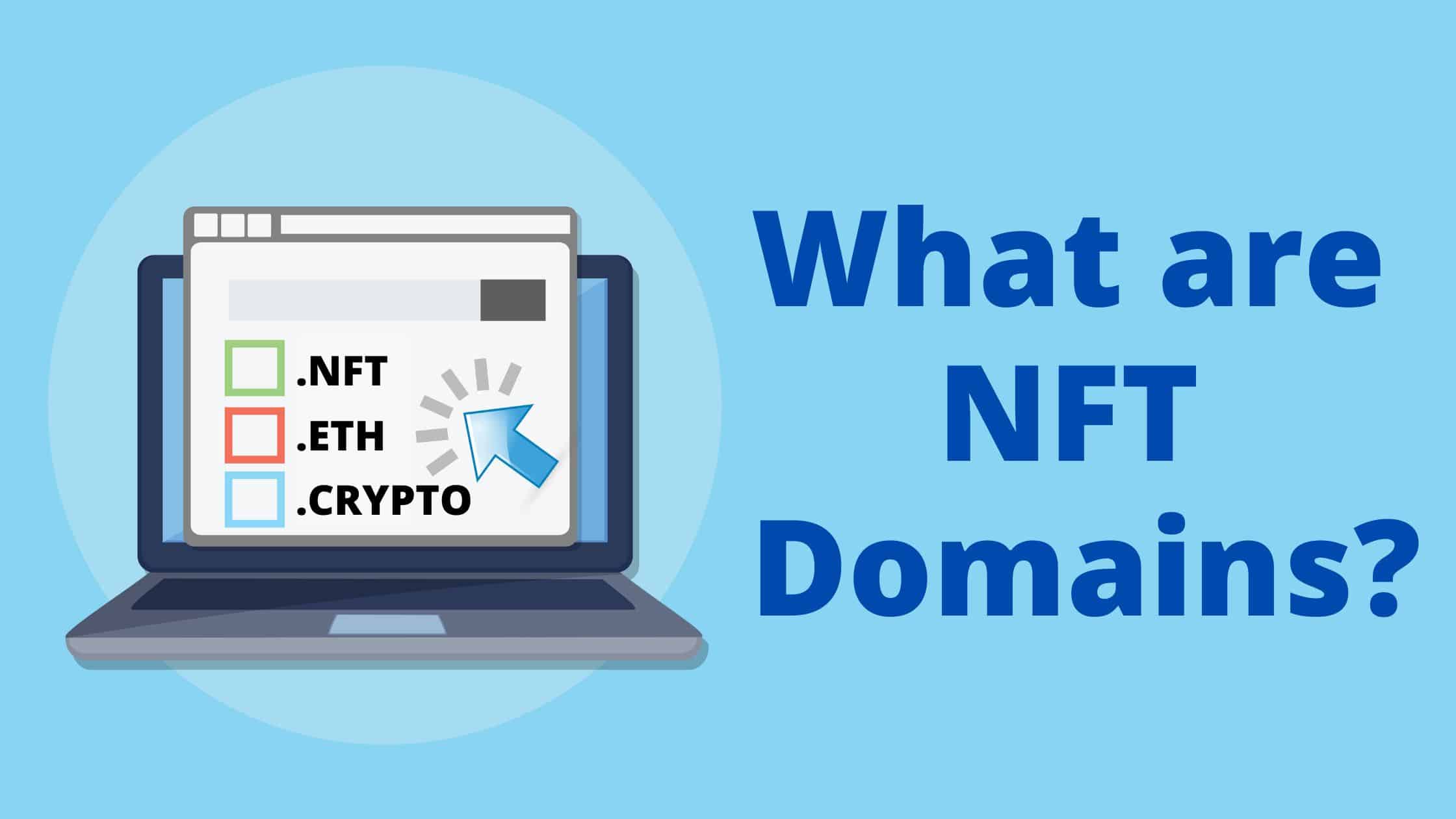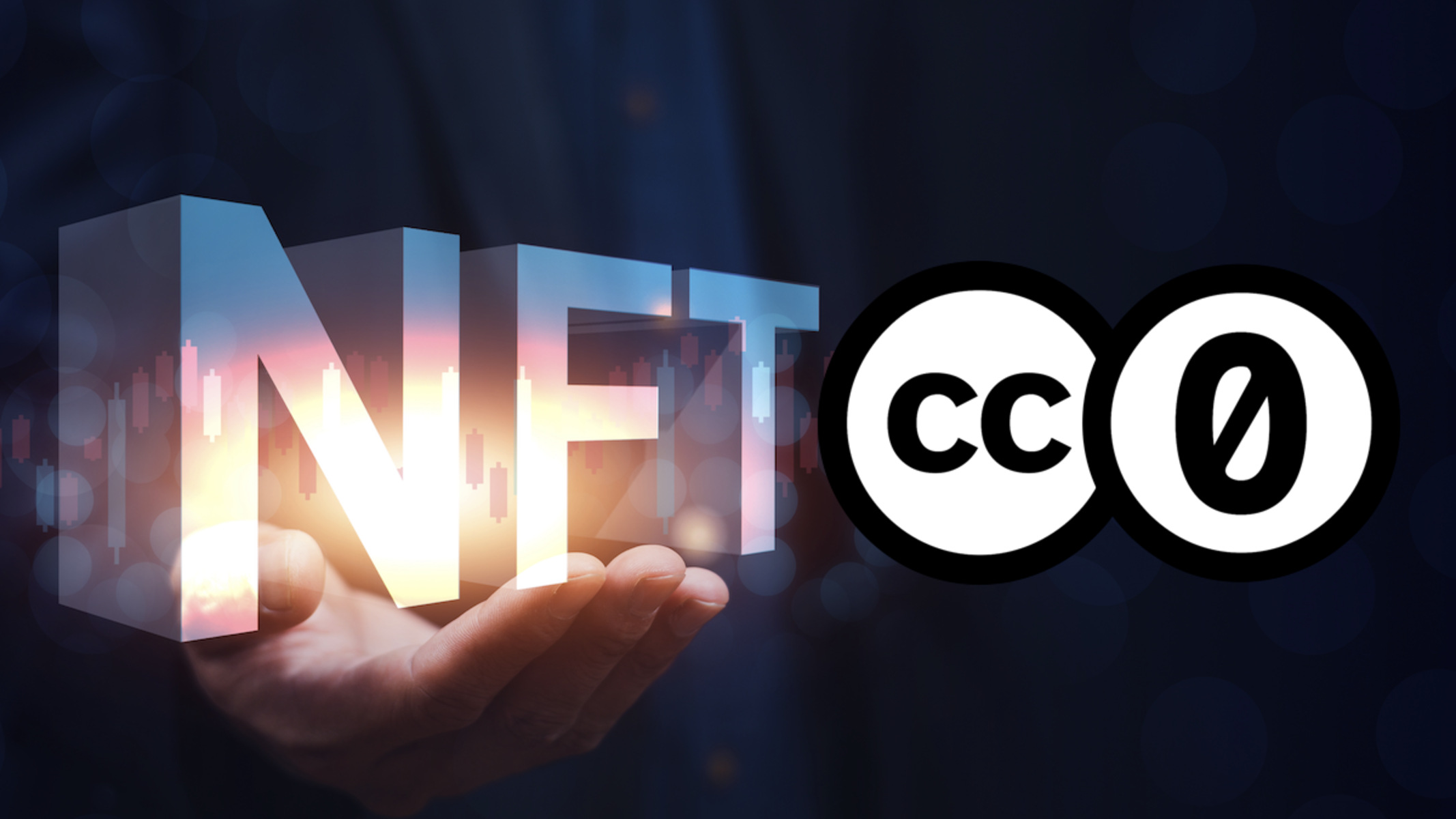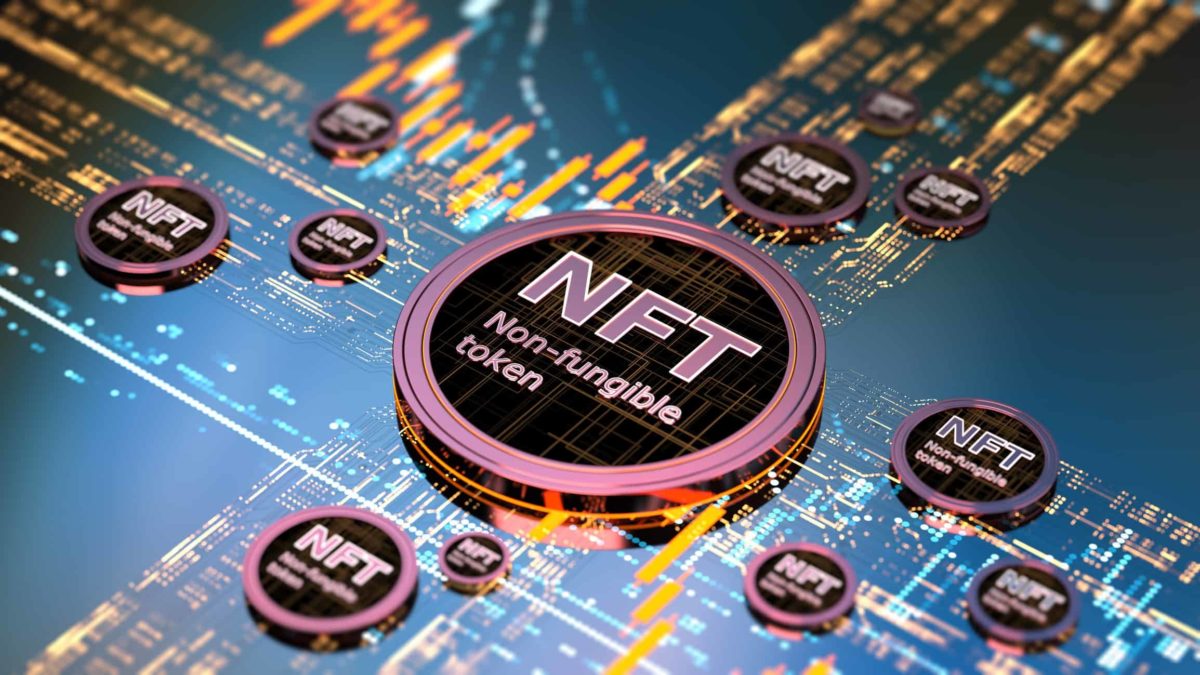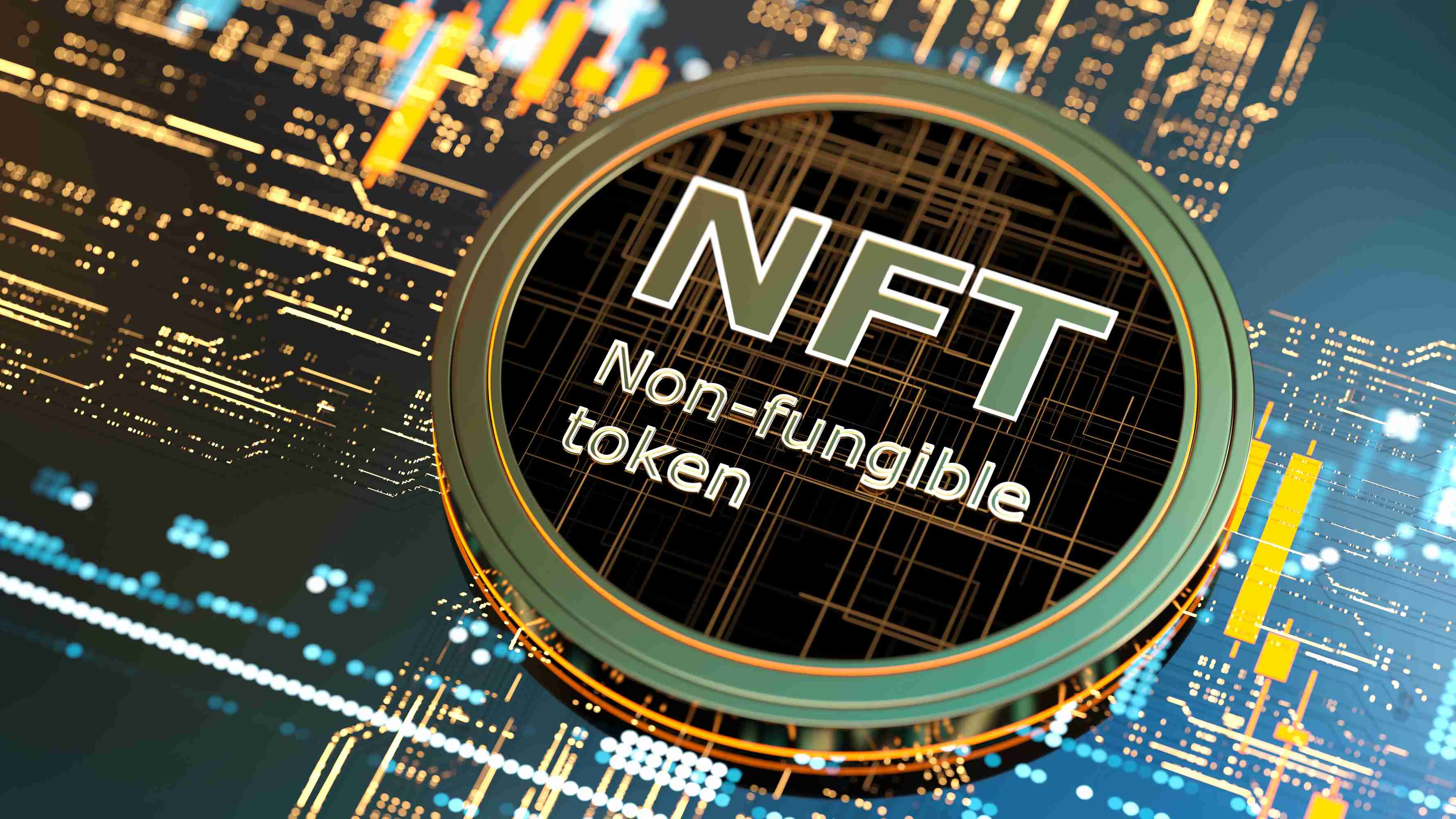What Is an NFT Domain?
An NFT domain is a unique and valuable digital asset that combines the principles of blockchain technology with the concept of non-fungible tokens (NFTs). In simple terms, an NFT domain is a web domain registered on the blockchain as an NFT, allowing individuals to claim ownership and control over the domain name.
Traditional domain names, such as .com or .net, are managed by centralized authorities. However, NFT domains offer a decentralized alternative, where ownership and control are recorded on a public blockchain ledger, providing transparency, security, and immutability.
These NFT domains can be used just like traditional domains, allowing users to build websites, set up email addresses, and create online content. However, what sets NFT domains apart is their distinct value and transferability. Being an NFT means that each domain is unique and cannot be replicated, making it a scarce and valuable asset in the digital world.
NFT domains are powered by blockchain technology, which ensures transparent and secure transactions. The use of smart contracts, which are self-executing and enforceable agreements, allows the transfer of ownership rights between parties without the need for intermediaries.
Moreover, NFT domains provide individuals with full control over their digital presence. No longer do individuals have to rely on centralized authorities to manage their domains. Instead, they have the power to transfer, sell, or lease their NFT domain directly to others, thereby creating an efficient and decentralized marketplace for digital assets.
As NFTs gain more popularity in the art and collectibles space, NFT domains present a new frontier in digital asset ownership and investment. Their uniqueness and scarcity make them attractive to individuals and organizations looking to establish a unique online identity or invest in digital real estate.
Overall, NFT domains represent a revolution in the traditional domain name system, incorporating the benefits of blockchain technology to provide individuals with greater control, transparency, and value in their online presence.
The Basics of Blockchain Technology
Blockchain technology serves as the underlying foundation for NFT domains. It is a decentralized and distributed ledger that records transactions across multiple computers or nodes. These transactions are grouped into blocks, which are linked together in a chronological and immutable chain.
One of the key features of blockchain technology is its transparency. Each transaction recorded on the blockchain is visible to all participants, promoting accountability and reducing the risk of fraudulent activities. Additionally, the decentralized nature of blockchain ensures that no single entity has complete control over the network, making it highly resistant to censorship and hacking attempts.
Another fundamental aspect of blockchain technology is security. Transactions on the blockchain are secured using cryptographic techniques, making it nearly impossible to tamper with or falsify the data. This security, coupled with the consensus mechanism employed by the network, ensures the integrity and trustworthiness of the information stored on the blockchain.
Furthermore, blockchain technology eliminates the need for intermediaries in transactions. By leveraging smart contracts, which are self-executing and immutable agreements, blockchain facilitates direct peer-to-peer transactions, reducing costs, and increasing efficiency.
One of the most well-known use cases of blockchain technology is cryptocurrencies, such as Bitcoin and Ethereum. Cryptocurrencies operate on their own blockchain networks and provide an alternative to traditional centralized financial systems.
However, blockchain technology has extended beyond cryptocurrencies and has found applications in various industries. From supply chain management to healthcare, blockchain is used to create transparent and tamper-proof systems, ensuring trust, efficiency, and accountability.
In the context of NFT domains, blockchain technology guarantees the ownership and authenticity of these digital assets. The use of blockchain enables verifiable records of ownership, ensuring that NFT domains cannot be duplicated or manipulated.
Understanding the basics of blockchain technology is essential to grasp the significance of NFT domains. By harnessing the power of blockchain, these digital assets offer a new paradigm for online asset ownership, security, and transferability.
Understanding Non-Fungible Tokens (NFTs)
Non-Fungible Tokens (NFTs) have gained significant attention in recent years, particularly in the world of digital art and collectibles. Unlike cryptocurrencies such as Bitcoin or Ethereum, which are fungible and can be exchanged on a like-for-like basis, NFTs are unique digital assets that cannot be replaced or interchanged with one another.
At the core of NFTs is the concept of digital scarcity. Each NFT is associated with a distinct identifier and metadata that establishes its uniqueness and authenticity. This metadata can include details such as the creator’s information, the creation date, and even the history of ownership.
NFTs are built on blockchain technology, which ensures transparency, security, and decentralization. By leveraging the decentralized nature of blockchain, NFTs provide a reliable and verifiable way to prove ownership of digital assets.
One of the key advantages of NFTs is their ability to represent ownership of both tangible and intangible assets in the digital realm. This opens up opportunities for artists, musicians, content creators, and even virtual real estate owners to monetize their work and establish verifiable ownership rights.
NFTs have revolutionized the art industry by allowing artists to tokenize their work and sell them directly to collectors without the need for intermediaries. This has created new revenue streams for artists, helping them gain recognition, reach a global audience, and receive royalties for subsequent sales.
Moreover, NFTs have expanded beyond the art world and are now being used to tokenize real-world assets such as real estate, virtual land, and even in-game items. This provides individuals with a pathway to invest in unique digital assets and participate in new economies.
It is important to note that NFTs do raise concerns and criticisms regarding their environmental impact and potentially inflated market values. The energy consumption associated with blockchain networks supporting NFTs has led to discussions on sustainability and the need for more eco-friendly alternatives.
Nonetheless, NFTs have pioneered a new era of digital ownership, empowering creators and collectors alike. By combining the capabilities of blockchain technology with the concept of uniqueness and verifiability, NFTs have transformed the way we perceive and trade digital assets.
How NFT Domains Work
NFT domains leverage blockchain technology to revolutionize the domain name system and provide individuals with unique and valuable digital assets. Here’s a breakdown of how NFT domains work:
1. Registration: NFT domains are registered on a specific blockchain network, such as Ethereum. Each domain is represented as a non-fungible token (NFT) with a unique identifier and associated metadata.
2. Ownership and Control: By owning an NFT domain, individuals have complete control over the domain name and its associated functionality. They can use the domain to create websites, set up email addresses, and establish an online presence.
3. Smart Contracts: NFT domains are powered by smart contracts, which are self-executing agreements recorded on the blockchain. Smart contracts facilitate the transfer of ownership rights and allow for the creation of decentralized marketplaces for buying and selling NFT domains.
4. Interoperability: NFT domains can be used in conjunction with existing web infrastructure. For example, individuals can link their NFT domain to an IPFS (InterPlanetary File System) address, ensuring that their website’s content is decentralized and resistant to censorship.
5. Transferability: NFT domains can be bought, sold, or transferred just like any other digital asset. The ownership and transaction history of each NFT domain are recorded on the blockchain, providing transparency and ensuring the legitimacy of ownership transfers.
6. Resolver Systems: NFT domains utilize resolver systems that help translate human-readable domain names into machine-readable IP addresses. These resolvers ensure that when someone types in an NFT domain, they are directed to the correct content or website associated with that domain.
7. Decentralization and Security: The use of blockchain technology ensures that NFT domains are decentralized, removing the need for central authorities. This decentralization enhances security, as the ownership records and domain control are stored on a tamper-proof public ledger.
By combining the features of blockchain technology with traditional domain name systems, NFT domains offer a new level of control, transparency, and value to individuals looking to establish a unique online presence. They provide an innovative way to truly own and monetize digital assets while participating in a decentralized marketplace.
Benefits of NFT Domains
NFT domains offer several compelling advantages compared to traditional domain names. Here are some key benefits of NFT domains:
1. Unique and Scarce Digital Assets: Each NFT domain is unique and cannot be duplicated or replaced, making it a valuable and scarce digital asset. This uniqueness increases the desirability and potential value of NFT domains, especially as interest in digital assets and NFTs continues to grow.
2. Ownership and Control: With NFT domains, individuals have complete ownership and control over their online presence. They can transfer, sell, or lease their NFT domains directly, without relying on intermediaries or central authorities. This empowers individuals to truly own and monetize their digital assets.
3. Immutability and Authenticity: NFT domains are built on blockchain technology, ensuring immutability and authenticity. The ownership records and transaction history of NFT domains are transparent and verifiable, eliminating the risk of fraud or unauthorized changes to ownership.
4. Transferability and Liquidity: NFT domains can be easily bought, sold, or transferred, providing liquidity and flexibility for owners. The use of blockchain technology facilitates seamless and secure transfers of ownership, allowing individuals to participate in a vibrant marketplace for NFT domains.
5. Creative Expression and Branding: NFT domains give individuals the opportunity to express their creativity and establish a unique online presence. Whether it’s artists showcasing their work, content creators building their brand, or businesses differentiating themselves, NFT domains offer a new level of creative expression and branding possibilities.
6. Investment Potential: NFT domains have emerged as a promising investment opportunity. As the demand for unique and scarce digital assets continues to rise, NFT domains have the potential to appreciate in value over time. This has attracted investors who see the long-term value and potential returns associated with NFT domains.
7. Decentralization and Security: NFT domains operate on blockchain networks, providing decentralization and enhanced security. The decentralized nature of NFT domains removes the reliance on centralized authorities, reducing the risk of censorship or control. Additionally, the use of blockchain technology ensures transparent and secure transactions.
8. Interoperability and Innovation: NFT domains can be integrated with existing web infrastructure and technologies, allowing for seamless interoperability. They enable individuals to leverage other decentralized technologies, such as IPFS and decentralized storage solutions, to create more resilient and censorship-resistant online experiences.
In summary, NFT domains offer unique advantages that go beyond traditional domain names. The combination of ownership control, scarcity, security, and potential investment returns make NFT domains an intriguing option for individuals and businesses looking to establish a digital presence and participate in the growing world of digital assets.
Examples of NFT Domains
NFT domains have gained traction in various industries and have already seen notable examples of success. Here are some examples of NFT domains and their impact:
1. z.eth: The domain z.eth was one of the first-ever NFT domains to be minted and sold. It was auctioned off for a staggering amount of Ether (ETH) and represents the historic significance of NFT domains in the blockchain world.
2. crypto.com: The domain crypto.com was acquired by cryptocurrency exchange and payment platform Crypto.com. The purchase of this NFT domain helped reinforce the brand’s identity and establish itself as a leading player in the crypto industry.
3. metaverse.eth: This NFT domain represents the growing trend of virtual worlds and the metaverse. It has gained attention from investors and enthusiasts who believe in the potential of virtual reality and the interconnected digital universe.
4. art.gallery: NFT domains have particularly thrived in the art industry. The domain art.gallery exemplifies the integration of NFT technology in the art world, allowing artists to showcase and sell their digital artwork through this unique domain.
5. playtoearn.games: This NFT domain highlights the increasing popularity of play-to-earn gaming models. By owning this domain, individuals and companies can create platforms that empower gamers to earn real-world value through NFT-based gameplay.
6. realty.space: NFT domains have also extended their reach into the real estate industry. The domain realty.space presents an innovative use case where individuals can tokenize real-world properties and establish verifiable ownership through the NFT domain.
7. collectibles.io: The domain collectibles.io represents the NFT boom in the collectibles market. It serves as a hub for individuals to discover, buy, and sell various digital collectibles, such as trading cards, virtual assets, and unique digital items.
These examples demonstrate the versatility and potential of NFT domains across different sectors and industries. From cryptocurrency exchanges to virtual worlds, art platforms, and gaming ecosystems, NFT domains offer a new dimension of digital asset ownership and online identity.
As the NFT domain ecosystem continues to evolve, we can expect to see more innovative and unique use cases, pushing the boundaries of digital ownership and self-expression.
Investing in NFT Domains
Investing in NFT domains has emerged as an exciting opportunity for individuals looking to diversify their portfolios and capitalize on the growing popularity of digital assets. Here are some key considerations when it comes to investing in NFT domains:
1. Scarcity and Demand: NFT domains offer a unique form of digital asset ownership due to their scarcity and non-replicability. The limited supply of desirable domain names can drive up their value over time as demand increases. Identifying NFT domains with high potential demand can be a crucial aspect of successful investment.
2. Market Research: Careful market research is essential in understanding the current trends, demand patterns, and potential future growth of NFT domains. Analyzing historical sales data, monitoring marketplaces, and staying up-to-date with the latest developments can provide key insights for informed decision-making.
3. Brand Value and Relevance: When considering investing in NFT domains, it is important to assess the brand value and relevance associated with the domain name. Highly recognizable and memorable domain names can have a significant impact on the potential future value of the NFT domain.
4. Development Potential: Evaluating the development potential of an NFT domain is crucial. Some NFT domains come with built-in functionality or partnerships that can enhance their value and utility. Assessing the potential for future development and partnerships can contribute to the long-term growth and value of the NFT domain.
5. Liquidity and Marketplace: NFT domains can be bought and sold on various marketplaces, and assessing liquidity is important for investors. It is crucial to consider the availability of buyers and sellers, trading volumes, and transaction fees associated with specific marketplaces before making investment decisions.
6. Potential Risks and Volatility: As with any investment, investing in NFT domains carries certain risks. Market volatility, regulatory changes, and technological advancements are among the factors that can impact the value of NFT domains. It’s important to carefully consider the risks involved and allocate investment capital accordingly.
7. Long-Term Outlook: Investing in NFT domains requires a long-term perspective. While some NFT domains may experience rapid price appreciation, it’s essential to assess the long-term viability and potential future demand of the asset. Patience and a well-thought-out strategy can lead to greater returns.
8. Diversification: Like any investment portfolio, diversification is key. Investing in a range of NFT domains with different characteristics can help mitigate risk and maximize potential returns. Diversifying across different industries, trends, and even blockchain networks can provide exposure to a wider range of opportunities.
Investing in NFT domains can be an exciting and potentially lucrative venture. However, it is important to conduct thorough research, stay informed about the market, and carefully consider the potential risks and rewards associated with these digital assets. With strategic planning and a deep understanding of the NFT domain market, investors can position themselves for success.
Potential Use Cases for NFT Domains
NFT domains have opened up a world of possibilities beyond traditional domain names. Here are some potential use cases for NFT domains:
1. Digital Collectibles: NFT domains can serve as a platform for collecting and trading digital assets. Just as NFTs have revolutionized the world of digital art, NFT domains can enable the creation, ownership, and exchange of unique and valuable virtual collectibles, such as virtual trading cards, avatars, or virtual land parcels.
2. Intellectual Property Protection: NFT domains have the potential to protect intellectual property rights by providing a verifiable and immutable record of ownership. Artists, musicians, and creators can tokenize their work and grant NFT domains as proof of authenticity and ownership, protecting their intellectual property in the digital space.
3. Virtual Real Estate: NFT domains can be used to represent virtual real estate within online worlds and metaverses. Owners of NFT domains can create and monetize virtual spaces, whether it’s virtual stores, event venues, or entire virtual cities. This allows individuals and businesses to participate in the emerging market of virtual real estate and potentially generate revenue from virtual experiences and transactions.
4. Decentralized Websites: NFT domains can empower individuals to create fully decentralized websites. By linking an NFT domain to an IPFS (InterPlanetary File System) address, website content can be stored in a decentralized manner, making it resistant to censorship and ensuring permanent availability. This use case enables a truly decentralized internet, empowering individuals to have full control over their online presence.
5. Branding and Marketing: NFT domains offer unique branding opportunities. Companies can secure NFT domains that align with their brand and utilize them to create innovative marketing campaigns or drive customer engagement. Creative use of NFT domains can differentiate a brand from competitors and enhance the overall customer experience.
6. Membership and Access: NFT domains can be used to represent membership in exclusive clubs or access to privileged content or events. Owning an NFT domain can grant individuals special privileges, such as backstage access to virtual concerts, early access to limited edition products, or premium content subscriptions.
7. Tokenized Communities: NFT domains can be leveraged to create and sustain tokenized communities. By allocating NFT domains to community members, a sense of belonging and ownership can be fostered. These domains can serve as a gateway to community resources, interactions, and governance rights, creating vibrant and self-sustaining ecosystems.
These potential use cases illustrate the versatility and creativity that NFT domains bring to the digital world. From digital collectibles to virtual real estate, decentralized websites, branding opportunities, and tokenized communities, NFT domains are shaping new ways for individuals and businesses to interact, engage, and own digital assets.
Challenges and Considerations for NFT Domains
While NFT domains offer exciting opportunities, there are also challenges and considerations that need to be taken into account. Here are some key factors to consider when dealing with NFT domains:
1. Environmental Impact: The use of blockchain technology to support NFT domains has raised concerns about its environmental impact. The energy consumption associated with blockchain networks, especially those using proof-of-work consensus algorithms, has led to discussions on the need for more sustainable alternatives to minimize carbon footprints.
2. Regulatory Environment: The regulatory landscape surrounding NFTs and NFT domains is evolving. Governments and regulatory bodies are still grappling with how to categorize and regulate these digital assets. It is essential for individuals and businesses to stay informed about the legal and regulatory requirements in their jurisdictions to ensure compliance.
3. Market Volatility and Bubble Risks: The NFT market has seen periods of significant volatility and speculation, leading to concerns about a potential bubble. Prices of NFT domains can fluctuate dramatically, and it’s important for investors to carefully assess the market conditions and exercise caution when entering the market.
4. Ownership Disputes: While blockchain technology ensures transparent and verifiable ownership records, disputes can still arise. Determining the rightful owner of an NFT domain in cases of theft, fraud, or mistaken ownership can be a complex process. Clear protocols and mechanisms for addressing ownership disputes need to be established to provide accountability and transparency.
5. Network Scalability and Speed: As the popularity of NFT domains continues to grow, blockchain networks may face challenges in terms of scalability and transaction speed. Ensuring that the underlying blockchain infrastructure can handle the increasing demand is crucial for a smooth user experience and widespread adoption.
6. User Education and User Experience: NFT domains are still a relatively new concept, and there is a learning curve for understanding how they work. Educating users about the intricacies of NFT domains, including wallet management, transaction processes, and security best practices, is essential to prevent user errors and potential risks.
7. User Adoption and Ease of Use: To achieve widespread adoption, NFT domains need to become more user-friendly and accessible to individuals without a technical background. Improving user interfaces, simplifying the process of buying and selling NFT domains, and enhancing the overall user experience will be critical to attract a broader audience.
Considering these challenges and factors will help stakeholders in the NFT domain ecosystem navigate the evolving landscape. Addressing environmental concerns, staying compliant with regulations, assessing market risks, ensuring efficient network scalability, and prioritizing user education and accessibility are all key considerations for the successful development and adoption of NFT domains.
The Future of NFT Domains
The future of NFT domains holds immense potential and promises exciting developments in various aspects. Here are some key areas to consider when envisioning the future of NFT domains:
1. Mainstream Adoption: As awareness and understanding of NFTs and blockchain technology continue to grow, NFT domains are likely to see increased adoption among individuals, businesses, and institutions. The integration of NFT domains into existing web infrastructure and the creation of user-friendly platforms will play a vital role in bringing NFT domains to the mainstream.
2. Interoperability and Standards: The development of interoperability standards will drive the seamless integration of NFT domains across different blockchain networks. The ability to transfer and use NFT domains across various platforms, marketplaces, and decentralized applications (dApps) will enhance their utility and value, fostering a more connected and dynamic NFT ecosystem.
3. Integration with Virtual Reality (VR) and Augmented Reality (AR): The convergence of NFT domains with virtual reality and augmented reality technologies has the potential to reshape online experiences. Imagine walking into a virtual art gallery hosted on an NFT domain or using your NFT domain as a gateway to a fully immersive augmented reality experience. This integration has the power to revolutionize how we interact with digital assets and the metaverse.
4. Enhanced Digital Ownership and Control: NFT domains will continue to empower individuals with true digital ownership and control over their online presence. The use of smart contracts and blockchain technology ensures provable ownership, enabling individuals to monetize their digital assets and participate in a decentralized marketplace without relying on intermediaries.
5. Integration with DeFi: The integration of NFT domains with decentralized finance (DeFi) protocols can enable innovative financial applications and income streams. NFT domains could serve as collateral for borrowing, lending, or staking, or even as a means to generate passive income through revenue-sharing models or tokenized memberships.
6. Evolution of Digital Identity: NFT domains have the potential to play a vital role in establishing digital identity frameworks. By linking an NFT domain to personal or professional identities, individuals can create self-sovereign identities that enable secure and authenticated online interactions. This could lead to new possibilities in online verification, reputation systems, and privacy-enhancing technologies.
7. Environmental Considerations: Sustainable alternatives are likely to emerge to address the environmental concerns associated with current blockchain networks. Innovations in eco-friendly consensus algorithms or the integration of NFT domains with more energy-efficient blockchain architectures will help mitigate the carbon footprint of NFT domain transactions and contribute to a more sustainable future.
The future of NFT domains is rich with opportunities for innovation, creativity, and empowerment. As the technology matures, the integration of NFT domains across various industries and applications will further unlock the potential of digital asset ownership, decentralized marketplaces, and self-expression in the digital realm.
Conclusion
NFT domains represent a remarkable convergence of blockchain technology and digital asset ownership. These unique and valuable digital assets provide individuals and businesses with unprecedented control and ownership over their online presence. By leveraging the transparency, security, and decentralization of blockchain technology, NFT domains offer benefits that go beyond traditional domain names.
As NFTs continue to gain popularity and recognition across various industries, NFT domains present a new frontier in the digital asset landscape. From digital collectibles and virtual real estate to branding opportunities and tokenized communities, the use cases for NFT domains are expanding rapidly.
However, it is important to consider the challenges and considerations associated with NFT domains. Environmental impact, regulatory uncertainties, market volatility, and user education are among the factors that need to be addressed to ensure the sustainable growth and adoption of NFT domains.
Looking ahead, the future of NFT domains holds immense promise. Mainstream adoption, interoperability, integration with virtual reality, enhanced digital ownership, and integration with decentralized finance are among the areas where NFT domains are likely to evolve and thrive. The role of NFT domains in shaping digital identity frameworks and contributing to a more sustainable blockchain ecosystem should also be carefully considered.
As technology advances and the understanding of NFT domains deepens, it is crucial for stakeholders to navigate the evolving landscape with a strategic mindset. By staying informed, assessing risks, and seizing opportunities, individuals and businesses can fully leverage the potential of NFT domains in establishing unique online identities, participating in digital asset markets, and shaping the future of the decentralized web.

























